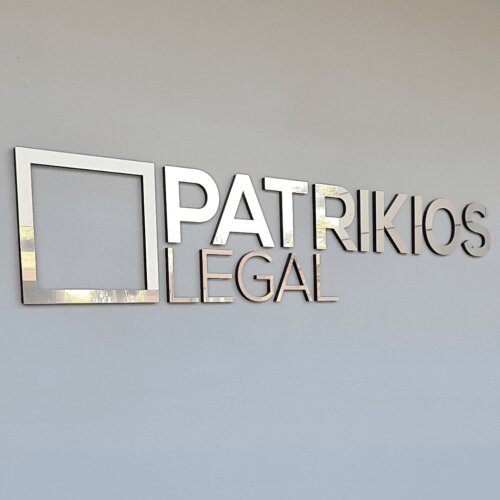Best Restructuring & Insolvency Lawyers in Cyprus
Share your needs with us, get contacted by law firms.
Free. Takes 2 min.
Or refine your search by selecting a city:
List of the best lawyers in Cyprus
About Restructuring & Insolvency Law in Cyprus
Restructuring and insolvency law in Cyprus deals with the financial difficulties that can affect individuals and companies, offering formal processes and legal remedies to address such challenges. The law covers both out-of-court arrangements for restructuring debts and court-supervised insolvency proceedings for companies and individuals who are unable to meet their financial obligations. Cyprus, as a member of the European Union, aligns its restructuring and insolvency framework with EU directives while maintaining national regulations which reflect the specific needs of the Cypriot market.
Why You May Need a Lawyer
There are various situations where legal advice in restructuring and insolvency becomes essential. If your business is experiencing cash flow problems, unable to pay creditors, or facing winding up procedures, consulting a lawyer can help you understand your options. Similarly, if you are an individual threatened with bankruptcy, a creditor seeking to recover debts, or a stakeholder in an insolvent company, legal guidance can be crucial. Lawyers assist in negotiating with creditors, planning voluntary arrangements, representing clients in court, and navigating the complex process of liquidation or restructuring. Engaging a professional ensures your rights are protected throughout these high-stakes processes.
Local Laws Overview
In Cyprus, restructuring and insolvency is governed by several laws, mainly the Companies Law (Cap. 113), Bankruptcy Law (Cap. 5), and related regulations. Key features include:
- Provision for voluntary arrangements with creditors, allowing debtors to restructure their obligations
- Procedures for the appointment of insolvency practitioners such as liquidators, examiners, and receivers
- Regulations for voluntary and compulsory liquidation, both for solvent and insolvent companies
- Bankruptcy proceedings available for individuals, including options for discharge and settlement
- Protection measures for both creditors and debtors, including the right to challenge transactions carried out prior to insolvency that may be unfair or preferential
- Incorporation of European Union insolvency regulations for cross-border cases
These laws set out the criteria for insolvency, the hierarchy among creditor claims, the responsibilities and powers of liquidators and other practitioners, and the available remedies for all parties involved.
Frequently Asked Questions
What is the difference between restructuring and insolvency?
Restructuring refers to processes intended to reorganize a company’s or individual's debts and affairs to allow financial recovery. Insolvency is when a person or company is unable to pay debts as they come due, often leading to liquidation or bankruptcy.
When should I consider insolvency proceedings?
If you or your business are unable to meet financial obligations, and negotiations with creditors are not successful, insolvency proceedings may be necessary to protect your interests and resolve outstanding debts.
Can I restructure my debts without going to court?
Yes, voluntary arrangements with creditors outside of court are possible and often preferable. Legal advisors can help negotiate and document these agreements to ensure all parties’ interests are considered.
What is voluntary liquidation?
Voluntary liquidation is when the shareholders or creditors of a company decide to wind up the company’s affairs in an orderly manner, typically when the company is unable to continue business or has achieved its purpose.
How are creditors paid during insolvency?
There is a specific order in which creditors are paid, with secured creditors and preferential creditors typically taking precedence over unsecured creditors. Any remaining assets are distributed according to the legal hierarchy.
What happens to employees in an insolvent company?
Employees are considered preferential creditors, with certain rights to outstanding wages and compensation. They also have specific protections under Cypriot employment law in insolvency situations.
Can directors of an insolvent company be held liable?
Directors may be held personally liable if there is evidence of wrongful or fraudulent trading, or if they have failed to fulfill their legal duties during insolvency.
What is the role of an insolvency practitioner?
Insolvency practitioners, such as liquidators and receivers, are responsible for managing the affairs of the insolvent estate, realizing assets, distributing proceeds, and reporting on progress to stakeholders.
How long does insolvency or liquidation take in Cyprus?
The timeline varies based on case complexity, asset values, and disputes among stakeholders. Simple liquidations can take a few months, while complex or contested cases may extend to several years.
Does Cypriot law recognize foreign insolvency proceedings?
Yes, as an EU member, Cyprus generally recognizes certain cross-border insolvency proceedings under EU regulations. International creditors also have defined rights in Cypriot insolvency cases.
Additional Resources
For more information and support, the following resources can be helpful:
- The Department of Registrar of Companies and Intellectual Property - for resources on company dissolution, liquidation processes, and insolvency practitioners
- The Supreme Court of Cyprus - for information on insolvency proceedings and case law
- Licensed insolvency practitioners and chartered accountants, who can provide professional guidance
- Cyprus Bar Association - offering directories of qualified lawyers specializing in restructuring and insolvency
- Consumer and creditor protection advocacy groups, which can provide support and information to individuals and businesses
Next Steps
If you are facing financial difficulties or believe you may require restructuring or insolvency assistance:
- Assess your situation and gather all relevant financial documents
- Identify the nature and extent of your debts and obligations
- Seek early legal advice from a lawyer experienced in restructuring and insolvency law in Cyprus
- Discuss all available options, from out-of-court arrangements to formal insolvency proceedings
- Engage professionals such as insolvency practitioners or accountants as needed
- Follow professional guidance to ensure compliance with local laws and protection of your rights
Taking prompt and informed action is essential. Practical advice from an experienced legal professional can help you minimize risks, manage liabilities, and achieve the best possible outcome during challenging financial times.
Lawzana helps you find the best lawyers and law firms in Cyprus through a curated and pre-screened list of qualified legal professionals. Our platform offers rankings and detailed profiles of attorneys and law firms, allowing you to compare based on practice areas, including Restructuring & Insolvency, experience, and client feedback.
Each profile includes a description of the firm's areas of practice, client reviews, team members and partners, year of establishment, spoken languages, office locations, contact information, social media presence, and any published articles or resources. Most firms on our platform speak English and are experienced in both local and international legal matters.
Get a quote from top-rated law firms in Cyprus — quickly, securely, and without unnecessary hassle.
Disclaimer:
The information provided on this page is for general informational purposes only and does not constitute legal advice. While we strive to ensure the accuracy and relevance of the content, legal information may change over time, and interpretations of the law can vary. You should always consult with a qualified legal professional for advice specific to your situation.
We disclaim all liability for actions taken or not taken based on the content of this page. If you believe any information is incorrect or outdated, please contact us, and we will review and update it where appropriate.
Browse restructuring & insolvency law firms by city in Cyprus
Refine your search by selecting a city.
















